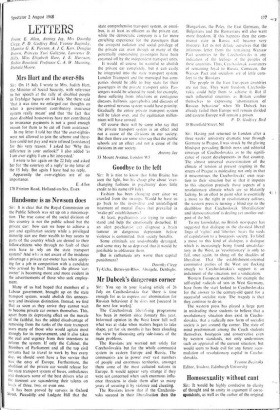Sir: Having just returned to London after a three weeks'
university dramatic tour through Germany to Prague, 1 was struck by the glaring blindspot pervading British news and editorial coverage of Czechoslovakia as to the signifi- cance of recent developments in that country. The almost universal overestimation of the climate of tension at present reigning in the streets of Prague is misleading not only in that it misconstrues the Czechoslovaks' own reac- tion to their situation but in that it imputes to this situation precisely those aspects of a revolutionary climate which are so blatantly lacking. In an effort to paint what is essentially a move to the right in revolutionary colours, the western press is turning a blind eye to the deathblow that Czechoslovak 'liberalisation' and 'democratisation' is dealing yet another out- post of the left.
To my knowledge, no British newspaper has suggested that dialogue in the classical liberal lingo of 'rights' and 'liberties' hears the seeds of capitulation to a bourgeois society. To label a move to this kind of dialogue, a dialogue which is increasingly being found unsatisfac- tory in the West, as 'revolutionary' is only to fail, once again, to shrug off the shackles of liberalism. That the establishment-oriented communist parties of the West are flocking smugly to Czechoslovakia's support is an indictment of the situation, not a vindication.
Western European students, for example the self-styled radicals of SDS in West Germany, have from the start looked to Czechoslovakia for the answer to the century-old quest for a successful socialist state. The tragedy is that they continue to do so.
The western press has played a large part in misleading these students to believe that a revolutionary situation does exist in Czecho- slovakia, that a radically new form of socialist society is just around the corner. The state of mind predominant among the Czech students themselves, bourgeois and conservative even by western standards, not only undermines such an appraisal of the current situation, but would seem to bode evil for any future accu- mulation of revolutionary capital in Czecho- slovakia.
Yvonne Baginsky Editor, Student, Edinburgh University






































 Previous page
Previous page